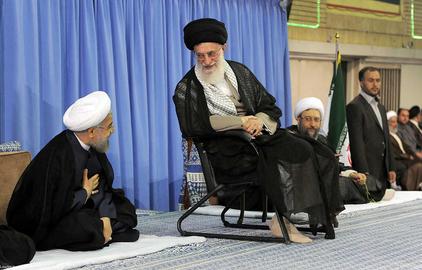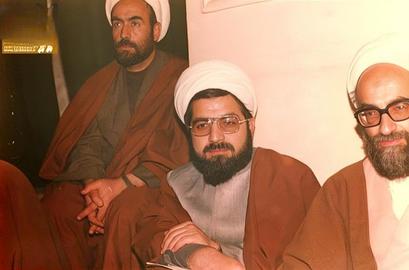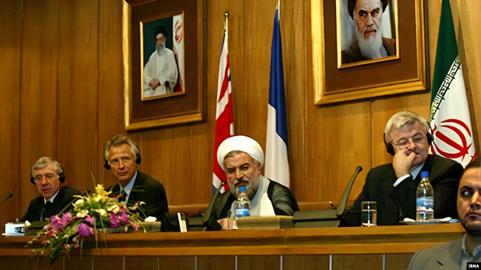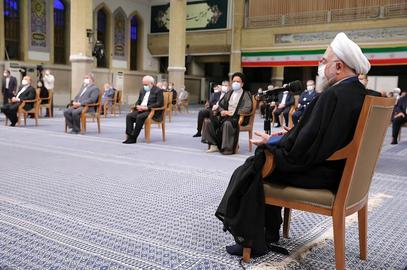Hassan Rouhani’s disqualification from the elections to the Assembly of Experts brings to light an attempt to completely eliminate the former president from Iran's political landscape.
The move was only made possible by a request or approval by Supreme Leader Ali Khamenei, and it marks the culmination of a twisted and contentious relationship between the two men.
Similar to the dynamics between Akbar Hashemi Rafsanjani and Khamenei in the early years of the 1979 Islamic revolution, this relationship went through serious tensions which reached their climax near the 45th anniversary of the revolution.
***
Despite his extensive background in politics, Hassan Rouhani is positioned in the second tier of senior officials of the Islamic Republic, and essentially falls under a subgroup headed by Hashemi Rafsanjani.
In the 2013 elections, Khamenei approved Rouhani's candidacy while granting permission to disqualify Rafsanjani.
However, tensions escalated during Rouhani's presidential term, with the two leaders publicly exchanging barbs and taunts.
Relations Before the Revolution and During the War
Before the revolution, Khamenei and Rouhani were not particularly close, and they had limited interactions. Rouhani has mentioned visiting Khamenei during his military service.
After 1979 both men found themselves in the parliament, and Khamenei was later elected as the president.
Rouhani played a role as a replacement for Hashemi in certain areas during the Iraq-Iran war. However, during that period, Rouhani and Khamenei were considered somewhat incompatible with the Islamic Revolutionary Guard Corps (IRGC).
Rafsanjani has cited reasons for Mohsen Rezaei's resignation from the IRGC in the war's last years, including conflicts with the army and a lack of coordination with Rouhani and Khamenei.
"Rezaei expressed his intent to inform Imam [Rullollah Khomeini] about issues within the IRGC, the lack of coordination with the president, Rouhani and the army, and resign," Rafsanjani wrote in his memoirs.
Rouhani was part of the Iranian team involved in secret negotiations with the Americans. Security personnel from Mirhossein Mousavi's administration, such as Mohsen Kangarlo, stated that all officials, including Khamenei, knew about these talks.
However, Khamenei and Mousavi did not hold favorable opinions about these negotiations.
Rouhani backed an end to the war, while Khamenei did not express serious opposition.
Nevertheless, in recent years, Khamenei's associates have criticized Hashemi and Rouhani for their roles in accepting the resolution for ending the conflict in 1988.
Disagreement on the Merger of the Army and IRGC
The focal point of contention was the proposed merger of the IRGC and the regular army, along with other issues related to the armed forces.
Rouhani and Abdullah Nouri presented proposals that faced opposition from the leader of the Islamic Republic.
Rafsanjani also noted that Rouhani expressed concerns about Khamenei's plan to reinstate the Joint Staff of the Army.
During the constitutional revision, the Supreme National Security Council was established, and President Rafsanjani assigned Rouhani the responsibility of forming its secretariat and organizing the council.
In the early years of Khamenei's leadership, the first US attack on Iraq occurred. The leftist movement aimed to join the war in support of Saddam Hussein, but both Rafsanjani and Rouhani opposed that.
Vice Speaker of Parliament
In the fourth parliament, characterized by a coalition between the so-called right-wing movement and the faction supporting Rafsanjani, a significant competition unfolded.
Rafsanjani's camp aimed to have Rouhani elected as speaker, but Ali Akbar Nategh-Nuri ultimately assumed the role.
Amid the rise of the reformist movement after May 23, 2000, Rouhani, as vice speaker of parliament, maintained a close connection with Mohammad Khatami’s administration in certain instances.
Rafsanjani mentioned in his memoirs that Nategh-Nuri held an unfavorable view of Rouhani.
"Mr. Nategh believes that Mr. Rouhani oversees the signing process of the letter [by the representatives] in support of Mr. Khatami. He holds an unfavorable view regarding the proposal to collaborate with him for the activation and coordination of the right and center factions," Rafsanjani wrote.
During Khatami's presidency, Rouhani played a dual role. While having at times a harmonious relationship with Khatami's government, he was generally aligned with Khamenei’s views.
Movements close to Khamenei attempted to implicate Rouhani in the Tehran Municipality corruption case.
"Mohammad Reza Naqdi, the commander of the police information protection organization, apologized for including false statements and names of some defendants, including Rouhani, in the reports. It was evident that these statements were intended to find accomplices and divert attention," Rafsanjani wrote.
In the elections for the 6th parliament, Rouhani was not included in the Islamic Iran Participation Front's list or the reformist movement known as the Second Khordad [May 23] Front.
Instead, he was included in the list of Executives of the Construction Party whose godfather was Rafsanjani.
A significant moment in Rouhani's role supporting the government and Khamenei was his speech at a government rally where he issued threats against protesters.
During the Khatami administration, Rouhani remained the secretary of the Supreme National Security Council, and the nuclear issue brought him into the public spotlight.
Rouhani, in his memoirs, mentioned that both the president and the supreme leader requested him to lead the negotiations with world leaders, with Khamenei asking him to "take a burden off the shoulders of the system."
However, Khamenei criticized the administration over the nuclear talks, not Rouhani.
In a meeting with students of Yazd University in 2006, he expressed his opposition to the negotiations: "At the officials' meeting, I stated that if they intended to persist with this ongoing cycle of demands, I would personally intervene. True to my word, I took action. I emphasized that the pattern of retreat had to cease and transform into a trajectory of progress. The initial step, I insisted, should be initiated within the government where this retreat had been occurring, and indeed, that is precisely what transpired."
JCPOA Deepened the Gap
In 2013, Khamenei did not oppose Rafsanjani's candidacy and told Rouhani that Rafsanjani would not run in the presidential election, according to reports.
Khamenei's relations with Rouhani's administration closely mirrored his interactions with Khatami's.
One of Rouhani's initial acts of taboo-breaking was his telephone conversation with US President Barack Obama, which Khamenei did not strongly react to due to his good relations with the administration.
However, he publicly criticized it, stating, "We support the diplomatic activity of the government and attach importance to the diplomatic effort, although some events that occurred during the trip to New York were inappropriate in my opinion."
The most significant conflict centered around the 2015 nuclear deal.
Despite Khamenei's approval of the Joint Comprehensive Plan of Action (JCPOA) agreement, he labeled it as "sheer damage" and consistently criticized Rouhani and his administration for the deal.
Bitter Meetings
From the outset of Rouhani's second term as president, tensions with Khamenei became apparent.
Khamenei criticized Rouhani's statements during debates, and the president responded saying, "You are not happy with my election."
Then attacks from institutions controlled by Khamenei intensified, particularly regarding the case involving Rouhani's brother, Hossein Fereydoun.
Khamenei's farewell meeting with the Rouhani government was notably chilly, marked by criticism of the government's "trust" in Western countries and an absence of customary rituals such as a commemorative photo or the gifting of a Quran.
The brevity of Khamenei's speech, 17 minutes, was seen as an expression of his displeasure.
Alireza Moeizi, the deputy director of Communications at the president's office, attributed these events to COVID-19 restrictions for official meetings. However, Khamenei's aides continued to demand Rouhani be put on trial after the end of his administration.
In December 2021, news of a meeting between Rouhani and Khamenei surfaced. This meeting was reportedly held at Rouhani's request.
From the perspective of Khamenei's associates, Rouhani’s recent disqualification marks the end of his political career.
Javad Karimi Qudousi, a fundamentalist member of parliament close to the IRGC Intelligence Organization, welcomed it.
visit the accountability section
In this section of Iran Wire, you can contact the officials and launch your campaign for various problems










![In the elections for the 6th parliament, Rouhani was not included in the Islamic Iran Participation Front's list or the reformist movement known as the Second Khordad [May 23] Front. In the elections for the 6th parliament, Rouhani was not included in the Islamic Iran Participation Front's list or the reformist movement known as the Second Khordad [May 23] Front.](https://static.prod.iranwire.com/_versions_jpg/articleslide/image1-transformed_QdXX__v516x270__.jpg)





















comments